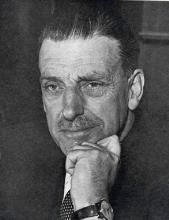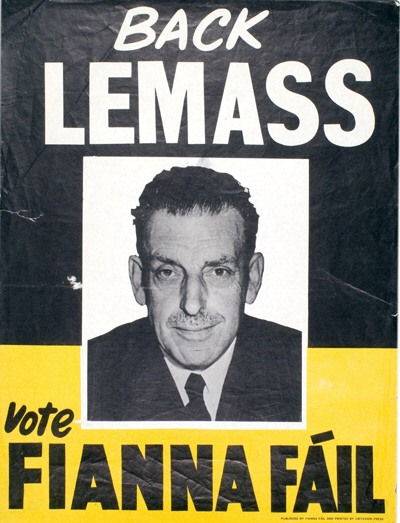Seán Lemass 1959 - 1966:
Seán Lemass was an exceptionally able and dedicated politician who was a dynamic patriot of great force and a political giant of 20th century Irish history. The Irish Times editorial upon his death in 1971 described him as a "supreme pragmatist".
Lemass could be legitimately described as the man who made modern Ireland. He was an individual who was present at some of the most historic occasions in the history of this country. Seán Lemass took part in the 1916 Rising, and was active in the War of Independence. He was in the Four Courts when the Civil War commenced, and was central to the establishment of the largest and most successful political party in the state.
This was a man who was a member of the Government that gave us our constitution. He was a key economic minister and was the Taoiseach who started us on the road to the European Union. It was Seán Lemass who was the first Taoiseach to go to Stormont as he and Captain Terence O'Neill sought to establish a brave new departure in North-South co-operation. Lemass internationalised our economy and set in train a new era of foreign investment and free trade.
In short, Seán Lemass was there for every key event for fifty years from the Rising to his retirement, as Taoiseach, in 1966.
Seán Lemass became leader of Fianna Fáil and Taoiseach in 1959, serving that role until 1966 when he was succeeded by Jack Lynch. Lemass was an outstanding minister during the de Valera years in office and was unanimously elected as leader of Fianna Fáil upon Eamon de Valera’s resignation.
Born in Dublin in 1899, at fifteen years of age Lemass joined the Volunteers. He fought in the GPO in the Easter Rising of 1916 and was in the Irish Republican Army during the War of Independence.
Former Party Leaders & Taoisigh:


He was arrested in 1920 and interned for a year at Ballykinlar, County Down. Lemass was in the Four Courts as second in command at the start of the Civil War. Captured, he escaped only to be captured once more. From December 1922 to December 1923 Lemass was interned. The future Taoiseach made use of his time in prison, researching, among other topics, economics. This was to prove beneficial in later years.
Seán Lemass was first elected to Dáil Éireann for Dublin South City in 1924. In 1926 he was a member of the organising committee and a founder member of Fianna Fáil. He travelled extensively around the country, establishing branches of the Party. Fianna Fáil became a nation-wide organisation at a phenomenal speed, and by the summer of 1927 more than 1,000 cumainn had been formed. By 1932 this had risen to over 1,400 cumainn. This was also the same year that Lemass, at the age of thirty-two, became the youngest cabinet minister in Europe, becoming Minister for Industry and Commerce.
During World War II (or The Emergency as it was known in Ireland), Seán Lemass was Minister for Supplies responsible for providing food for the people. He became Tánaiste in 1945 and implemented Fianna Fáil’s policy of protection to create conditions within which indigenous industries could be built up. He developed the country’s native industry behind a tariff wall and promoted state boards to develop resources such as Bord na Mona, Aer Lingus, Irish Shipping and the Irish Tourist Board.
In government Lemass, advised by the secretary of the Department of Finance, TK Whitaker, introduced the First Programme of Economic Expansion which was to have a tremendously positive effect on the Irish economy. As Taoiseach Lemass believed that a rising economic tide would lift all boats. In 1960 he stated “The historical task of this generation is to consolidate the economic foundations of our political independence.”
The 1960s was an era of economic expansion and industrialisation. In 1965 Seán Lemass re-established free trade with Britain, seeing this as a prelude to a joint entry into the Common Market (now the European Union).
During Lemass’ time in government Irish troops joined the United Nations Peacekeeping Force for the first time, the start of a successful tradition. During his tenure as Taoiseach Lemass outlined a peaceful path to progress on the national question. He continued de Valera’s gradualist approach to unity with its dedication to unite (in Wolfe Tone’s words) ‘Catholic, Protestant and Dissenter’ under the common name of Irishmen. He made serious efforts to normalise relations with the Northern Ireland Government under Prime Minister Captain Terence O’Neill. In January 1965 Lemass visited Belfast to meet with O’Neill in an attempt to thaw the cold war between north and south.
One of the greatest innovations of the Lemass years as Taoiseach was the introduction in 1966 of free Second Level education which revolutionised Irish education. Second Level education became no longer the privilege of the better-off but was opened up to all, a decision that benefitted the country enormously.
Seán Lemass undertook the journey from young revolutionary to constitutional politician and democratically elected head of Government, coming to understand the futility of political violence. He oversaw a generational shift in the leadership of Fianna Fáil and had a belief in harnessing the energy and enthusiasm of our country’s young people as a necessary source of renewal and vitality in politics. This reflects the positive pragmatism which Lemass brought to the political scene.
Lemass was central to Ireland's emergence from the international sidelines. His vision and foresight were at the forefront of Ireland's first application to join the EEC. In 1962, he insisted at the EEC's Council of Ministers that Ireland's rightful place was at the heart of Europe:
Ireland belongs to Europe by history, tradition and sentiment no less than by geography. Our destiny is bound up with that of Europe and our outlook and our way of life have for fifteen centuries been moulded by the Christian ideals and the intellectual and cultural values on which European civilisation rests.
Seán Lemass could rightfully be regarded as one of the most influential Irish politicians of the twentieth century. His progressive politics led the country through difficult times, and laid the foundations for future generations. Lemass was strong in his belief in the Irish people - “There is almost nothing on earth that the people of this country cannot do better, or as well, as other people, once they apply their minds to it”, - they, in turn, were strong in their belief in Seán Lemass, one of the most important men in our country’s history.
